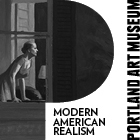
|
||
|
Portland art blog + news + exhibition reviews + galleries + contemporary northwest art
|
||
Reviewing the week It has been a good week of reviews. More than occasionally, both random and
not so random people stop me and unload a rant about the state of art criticism
in Portland and the world in general. Agreed, art criticism isn't in some golden
age but I dont think it is in the same imminent crisis others ascribe to it either.
This week, besides my own abomination (blithely doing things that would have made my 600 level, critical writing prof get "all paperchase and Housemanesque" on me 13 years ago) we had some nice reviews. Instead of focusing on personalities or being reactionary towards the success, fame or "newfangledness"of an artist they took subject matter and the overall effect into account. An exciting development considering that and the fact there were 4 serious reviews published this week. Too bad I count about 25 shows worthy of reviews this hyperactive month. First off was Richard Speer's review of Brendan Clenaghen's show. Short, eloquent, on topic and yes it's a great show that definitely shows that sometimes Portland artists are superior to anything similar nationally. Pulliam Deffenbaugh has really improved as a gallery since moving into the new space and with the addition of Matthew Picton (just this week) alongside Clenaghen, Linda Hutchins and Laurie Reid there is a reason they might just be the most reviewed gallery in Portland. Then John Motely (whose role seems to be one of the last bastions of non-tabloid twaddle at the Mercury) penned this evocative bit on Sutapa Biswas at Reed. Reading it, I was reminded how frequently video shows receive one-dimensional reviews that simply provide a travelogue account of the experience or simply a one line description. Instead, this was a layered and at length. Last but not least, David "Death" Row published this relevant thing on Tad Savinar. True, if I were to go "Snark hunting" with any local writer DK would have to be at the top of the guest list but I agree with his focus on gentrification as a major civic issue in Portland and Tad's show. Besides, it makes sense that the pithy Savinar would get the attention of a purveyor of snark. Dont misconstrue this, snark can be a good thing, obsequious pleasantness is so dull and generally favors mediocrity. Posted by Jeff Jahn on September 15, 2006 at 11:00 | Comments (4) Comments I am enjoying the fact that you are, in a sense, reviewing the reviewers. Why should they be not held to the same scrutiny that artists are? Posted by: lsd Absolutely... Ive been doing it for years and hopefully it has had an effect. We can do things here that some of the dead tree media couldn't get away with. Actually, I think publishing some of the streetcorner discussions betwen PORT staffers and other critics would be really interesting Also, Ive been debating an open review thread each month... People could post their reactions to shows and other reviews but Im not certain enough people would chime in. The art world runs on proprietary knowledge and although the blogosphere opens the doors a little bit I still thing there is something to be said for not showing all the cards. Posted by: Double J Of course there is still something to be said for not showing all your cards, because (for just one reason) it could kill your career. Or so goes the logic. .....But could it? I wonder about this. The assumption is that critics can make or break careers. Maybe they do, maybe they don't; sort of depends on many variables. Exposure of the right thing at the right time would be key. But who is to say that artists are powerless, that they cannot put writers in the hot seat? Posted by: lsd Art critics rarely make or break careers... theater critics, some food critics and Robert Parker (wine) have held that kind of power more often. Instead; reviews, chatter at shows and other activity matter in clusters in the art world (chatter from the right people is best). I think it is almost superstitious the way critical attetion is attributed as some sort of make or break activity in the art world. In a scene like New York that kind of superstition can have a monetary effect, in Portland it more or less functions as a way to keep people interested in a show's particulars after the opening. Either way its good for people to take up positions and then challenge those positions. Posted by: Double J Post a comment Thanks for signing in, . Now you can comment. (sign out)
(If you haven't left a comment here before, you may need to be approved by
the site owner before your comment will appear. Until then, it won't appear
on the entry. Thanks for waiting.)
|
| s p o n s o r s |
 |
 |
 |
 |
 |
 |
 |
 |
 |
 |
 |
 |
 |
 |

|
Site Design: Jennifer Armbrust | • | Site Development: Philippe Blanc & Katherine Bovee | |


![[TypeKey Profile Page]](http://www.portlandart.net/nav-commenters.gif)